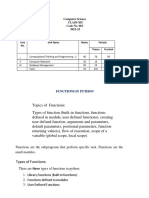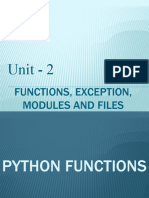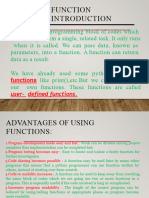0% found this document useful (0 votes)
22 views6 pagesClass 12 CS: Understanding Functions
Uploaded by
sharad9shashwatCopyright
© © All Rights Reserved
We take content rights seriously. If you suspect this is your content, claim it here.
Available Formats
Download as PDF, TXT or read online on Scribd
0% found this document useful (0 votes)
22 views6 pagesClass 12 CS: Understanding Functions
Uploaded by
sharad9shashwatCopyright
© © All Rights Reserved
We take content rights seriously. If you suspect this is your content, claim it here.
Available Formats
Download as PDF, TXT or read online on Scribd
/ 6
























































































